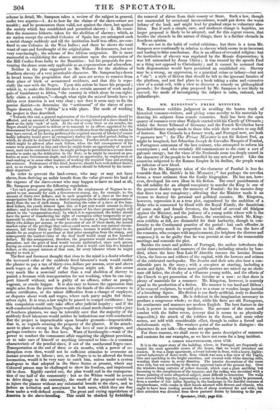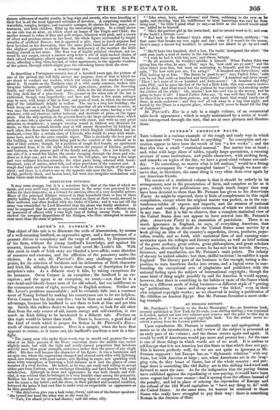MR. KINGSTON'S PRIME MINISTER.
Mn. KINGSTON exhibits judgment in avoiding the beaten track of historical romance-writers, and giving some novelty to his materials by drawing his subjects from remote countries. Italy has been the open quarry of romance ever since Walpole started with his Castle of Otranto; whilst the Secret Tribunal of Germany and the French Revolution have furnished themes ready-made to those who wish their readers to sup fall of horrors. But Circassia in a former work, and Portugal now, are both "pastures new " : for The Prime Minister is not Sir Robert Peel, as might be imagined, but Sebastian Joseph de Carvallio Marquis of Pomba], a Portuguese statesman of the last century, who attempted to reform his countrymen ; and who certainly did communicate to the state a sort of galvanic energy; but the vices of the Peninsula seem too deeply rooted in the character of the people to be remedied by any acts of power. Like the countries subjected to the Roman Empire in its decline, the people want an infusion of new blood.
The view Mr. Kingston takes of the character of Pombal is less fa.:. vourable than Mr. Smith's in his Memoirs ;* but perhaps the novelist forms a truer estimate than the family biographer. He has not, how- ever, developed his own ideas in his fiction. The cruel punishments of the old nobility for an alleged conspiracy to murder the King is one of the greatest doubts upon the memory of Pombal : for his enemies deny that there was any conspiracy; affirming that the Minister made it an excuse to destroy his personal and political enemies. Mr. Kingston, however, represents it as a true plot, engendered by the ambition of s Duke who is connected by blood with the Royal Family, the fanaticism of some male and female devotees, the hatred of several old fidalgos against the Minister, and the jealousy of a young noble whose wife is the- object of the King's passion. Hence, the executions, which Mr. King- ston exhibits at full, are distasteful for their barbarity, though in con- formity to the Continental practice of the period : but each offender ,is punished pretty much in proportion to his offence. Even the hero of the romance, who escapes with imprisonment, (to heighten the distress and suspense,) is so far guilty that he was present at one of the treasonable meetings and conceals the plot.
Besides the court and politics of Portugal, the author introduces the social characteristics and manners of the time; including attacks by ban- ditti, where the hero Don Luis D' Almeida rescues the heroine Donna Clara, the bravos and robbers of the capital, with the horrors and crimes of the celebrated earthquake. The Jesuits and their arts also bear a con- siderable part in the story; with a sea-piece at starting including a storm and fight. With these more public matters are mixed up an obsti- nate old father, the rivalry of a villanous young noble, and the efforts of the Church to get possession of the heroine as a nun : so that there is plenty of materials for a romance. Mr. Kingston, however, is scarcely equal to the production of a fiction. His manner is too hard and lifeless : if he essayed sculpture, he would give us a stone or wooden image instead of a breathing figure. His diction is too finely artificial, truly to describe nature or delineate man. He is deficient in the imagination necessary to produce a congruous whole ; so that, while his facts are old Portuguese, his sentiments and manners are modern English. The best feature in the book is power in narrating incidents. The account of the storm and combat with the Sallee rover, (except that it seems to us physically impossible,) the attack of the robbers in the forest, and some other scenes, are told with considerable effect, though in rather a forced and melodramatic style. The weakest point of the author is dialogue : the characters do not talk—they make set speeches.
For these reasons, we shall recur to the parts descriptive of manners and customs for our examples, as we have not room for a long incident.
A LISBON DRAWINGEOOM, circa 1750.
It is to the upper story of the building, where, in Portugal, are frequently si- tuated the most agreeable rooms of the house, that we would introduce our readers. It was a large apartment, a broad balcony in front, with a heavy, highly- carved balustrade of stone-work, from which was seen a fine view of the Tagus, blue and sparkling in the bright sunshine, and covered with white dancing sails, wending their course in every direction. The interior decorations of the room were rich, but not according to the most approved taste of the present day. Over the windows hung curtains of yellow damask, which cast a glare anything bat becoming to the complexions of the inmates; and the ceiling was decorated with a fresco painting of some allegorical subject, most difficult to determine. The walls were covered with tapestry, representing.; a scene in Arcadia, it might he presumed, from a number of fair ladies figuring in the landscape in the fanciful costume of shepherdesses, with crooks in their hands adorned with flowers and ribands, who ought to have been tending several flocks of sheep scattered far and wide; but their attention was diverted from these pastoral duties by listening to the pas • Spectator, 1813; page 613. sionate addresses of sundry, youths, in bag-wigs and swords, who were kneeling at their feet in.all the most approved attitudes of devotion. A surprising number of waterfalls, temples, bridges, and romantic cottages, fit abodes for love, peace, con- tentment, and little children, filled up the interesting picture. In a small alcove on one side was an altar, on which stood an image of the Virgin and Child; the mother dressed in robes of blue and gold stripes, trimmed with pink, and a crown of silver and precious stones on her head, the whole figure surrounded by bright wreaths of artificial flowers: but it appeared a pity, since so much expense had been lavished on her decoration, that the same pious hand had not afforded even the slightest garment to shelter from the inclemency of the weather the little smiling cherub in her arms. The floor was of highly polished chestnut, not co- vered by any carpet, except a narrow strip below a row of high. backed chairs, of dark carved mahogany, placed against the walls. Several doors opened from the room, affording a long vista beyond, of other apartments, to the opposite windows of the palace, through which might pass the refreshing breeze from the river.
A PORTUGUESE INN.
In describing a Portuguese country-inn of a hundred years ago, the picture of one of the present day will fully answer our purpose, even of that to which we are about to conduct our readers, which yet exists with few marks of change about it. It stands on the Northern edge of a wild sandy common, broken into irregular hillocks, partially sprinkled with gum-cistus' gentian, the flowering heath, and other low shrubs and plants; while in the far distance is perceived the long dark line of a pine-forest. The ground on the other side of the inn is cultivated, though very imperfectly; and here and there a few mean cottages may be seen, with heaps of dirt in front, and pools of mud, in which the favoured pigs of the inhabitants delight to wallow. The inn is a long low building; the bush hung out on a pole in front being the sign that all are welcome to enter, as was once the custom in England. The walls are of rough stone; having a row of windows, with red shutters, rather battered, and destitute of glass on the upper story. But the only opening on the ground-floor is the large entrance-door; which leads at once into a spacious stable, strewed with straw, and with no very great attention to cleanliness- a manger running round it, without any divisions for stalls, so that the animals therein may at will amuse themselves by kicking at each other, free from those unsocial restraints which English civilization has in- troduced,—very like a certain class of Liberals, who would do away with whole- some laws much for the same sensible object. This is decidedly the best part of the buildiiig, as much attention being paid to the comfort of the animals as to that of their owners; though, by a partition of rough deal boards, an apartment is separated from it to the right, which serves the purpose of kitchen, parlour, and bedroom, to the greater part of the family and guests. On a low hearth, on one side of it, a wood-fire blazes, the smoke escaping through the doors and win- dows as it best can; and on the walls, near the fire-place, are hung a few large and very ordinary kitchen-utensils; the other parts being adorned with horse- furniture, rows of onions, dried fish, and other provisions of the coarsest sort. A rough deal table and benches ran close to the wall the whole length of the apart- nient; and there is a shorter one on the opposite side near the fire. The floor is of clay, perfectly black, and beaten hard, but worn into irregular undulations and holes where most trodden on.
PORTUGUESE OFFICERS.
It may seem strange, but it is a notorious fact, that at the time of which we speak, and even until very lately, commissions in the army were procured by the nobles for their domestics, as a reward for services often of a very doubtful nature. Many of the principal fidalgos retained in their household three or four of these gentry bolding the rank of captain, who waited on them at their meals, dressed in their uniforms, and often decked with the Order of Christ; and it was not till the army was remodelled by Lord Beresford that the abuse was finally abolished. It may be supposed that an army so organized could not be in a very efficient state, or possess of officers with a very high tone of feeling among them. It &1st; showed the arrogant dispositions of the fidalgos, who thus attempted to assume even more than the state of princes.



























 Previous page
Previous page